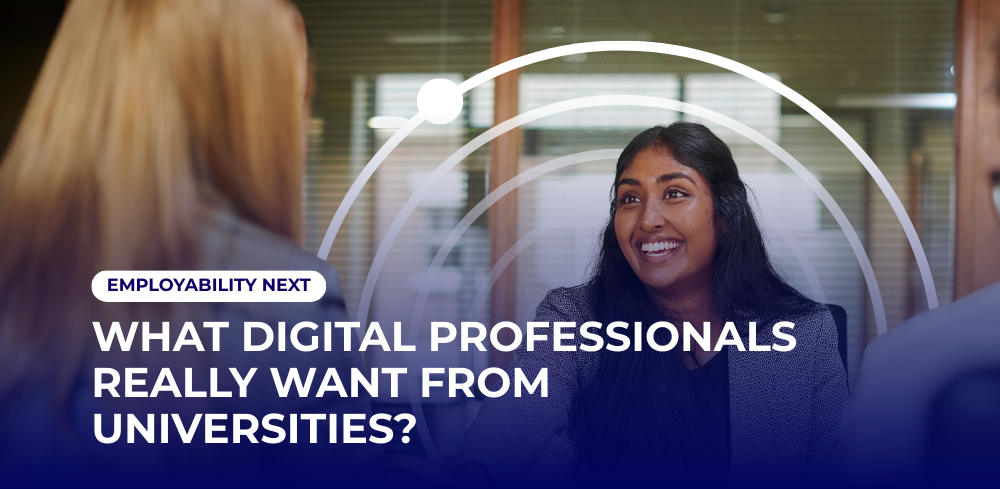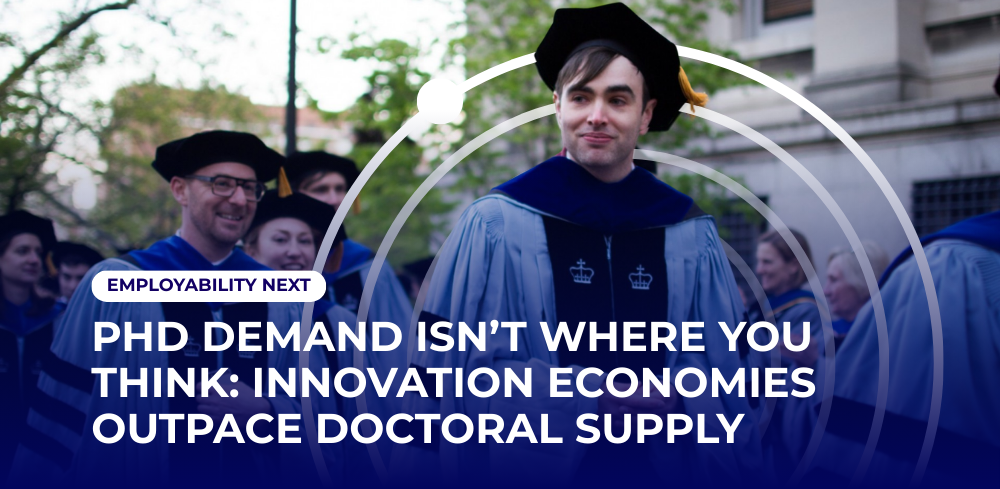Employability next | What digital professionals really want from universities

This article builds on the findings of Emerging’s Digital Leaders 2025 ranking, which explores how institutions worldwide are rising or lagging, when it comes to digital education. As Emerging has examined the academic supply side in previous articles, this piece shifts the lens to employer demand.
Based on a targeted analysis of GEURS 2025 (Global Employability University Ranking & Survey) and drawing from broader patterns identified in the Digital Leaders dataset, this article unpacks a new type of recruiter that is shaping the future of talent acquisition: the digital professional (DP) employer. These recruiters represent fast-growing digital-native firms or units, often at the forefront of AI, software engineering, and digital sustainability.
From tradition to disruption: a new employer archetype emerges
According to the survey, a new recruiter profile is emerging. The DP employer stands out across six dimensions.
- Research-oriented: DPs are more likely to seek out PhD graduates. This trend suggests that advanced, research-intensive profiles are gaining mainstream traction within the tech economy, not just for R&D roles, but across a wider range of functions.
- Openness to non-traditional credentials: while traditional universities still dominate reputational rankings, DP recruiters are more open to graduates from online programs, particularly when these programs deliver strong outcomes in AI and machine learning. For these employers, demonstrated skillsets increasingly outweigh the format of delivery.
- Interdisciplinary appetite… and anxiety: DPs are more likely to engage with interdisciplinary profiles that blend domains such as data science, sustainability, and business. However, they also report greater difficulty in assessing the readiness of such candidates, underscoring the need for clearer academic signals and industry-aligned framing.
- Sustainability-driven: DP recruiters increasingly expect and demand "green-tech" competencies, not only abstract sustainability awareness, but concrete technical skills.
- Collaboration-driven: DPs tend to engage universities as long-term partners, not just talent pipelines. Their firms are more likely to have dedicated teams for academic partnerships and prioritize joint R&D, startup incubation, and regional innovation.
- Global-minded: For DP employers, factors like international experience, fluency in technical stacks, and access to cross-border networks carry significant weight. In globally distributed teams and innovation hubs, these attributes become central to employability.
So what should institutions do to stay relevant in the eyes of this new generation of employers?
Building universities for a digital-first world
If DP employers are rewriting the rules of talent acquisition, universities must rethink how they prepare and present talent. What these recruiters are asking for isn’t a cosmetic update to curricula, but a redefinition of the university’s role in the innovation economy.
A digital-first university blurs the line between campus and company. Research becomes applied and porous, with industry projects woven into doctoral training and academic careers. Credentials don’t end at the diploma; they evolve into living signals, portfolios, verified badges, and assessments that employers can read at a glance.
This university also takes ownership of interdisciplinarity. Instead of producing hybrid profiles that recruiters struggle to decode, it builds pathways and capstones that make the blend of data, business, and sustainability visible and valuable.
It nurtures entrepreneurship by linking incubators to real industry challenges. It globalizes learning by embedding cross-border experiences into everyday study. And it hardwires sustainability into technical education so that green skills are not an elective, but a foundation.
In short, just as DP employers are no longer traditional recruiters, tomorrow’s universities cannot remain traditional suppliers of graduates. They must become strategic partners in innovation, sustainability, and growth.
From graduate factories to innovation engines, listening to these expectations, and acting on them, will be key for institutions aiming to remain relevant, not only in employability rankings, but in the broader digital transformation of the economy itself.
-
Co-authors: Sandrine Belloc and Victoire Chacon
Sandrine Belloc : As Managing Director at Emerging Group, Sandrine Belloc works between employers and higher education. She turns employability into a strategic edge, grounded in employer signals and broader market insight.
Victoire Chacon : Combining Python, machine learning, and advanced data visualization tools, she transforms complex datasets into impactful visual stories.
To dive deeper into the full findings or benchmark your institution’s alignment with digital employer expectations, reach out to communications@emerging.fr















